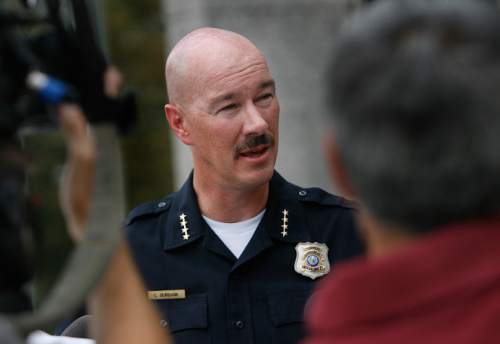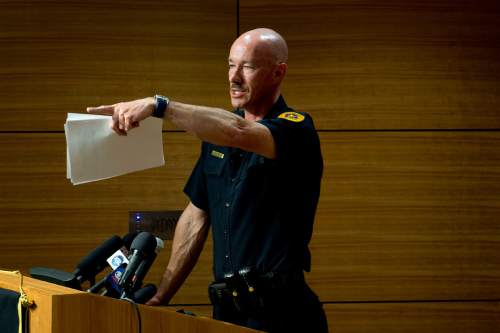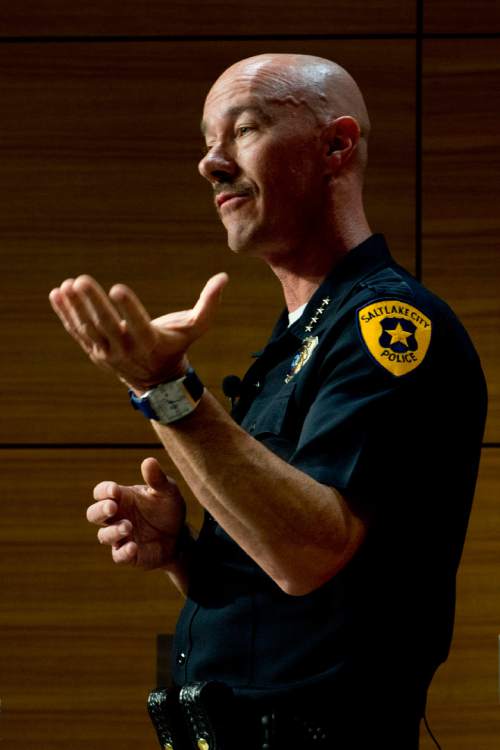This is an archived article that was published on sltrib.com in 2015, and information in the article may be outdated. It is provided only for personal research purposes and may not be reprinted.
Salt Lake City Police Chief Chris Burbank is defending his contacts with stun-gun and body-camera maker Taser, but agrees some law enforcement connections with the company merit scrutiny for conflicts of interest.
In June 2013, Burbank purchased 80 Taser body cameras and associated software and storage for $269,000 through a surplus police department fund, outside the city's normal budget process.
About the same time, Burbank appeared in a company video about police use of body cameras that lauded the Taser system.
The Associated Press included Burbank in its recent examination of police chiefs who accept employment with Taser after awarding the company lucrative contracts. It found at least one former chief who accepted expensive trips from the company.
Burbank, Salt Lake City's police chief since 2006, acknowledged Taser paid for one trip he made to the company's headquarters to give a presentation. He did appear in a company video, he said, but was not paid for that work.
Burbank and a spokesman for Mayor Ralph Becker on Tuesday pointed to errors in the AP account. Burbank did not violate any of the city's policies or procedures, Art Raymond said.
The AP's story said Burbank purchased 295 Taser body cameras, as well as the company's video storage program, without going through competitive bidding or the Salt Lake City Council's budget process.
Such an expenditure would be the equivalent of $769,000, rather than the actual $269,000 purchase, Raymond said.
The City Council was aware of that purchase of 80 body cameras and voiced concern over it at the time, according to Councilman Charlie Luke.
"It is important the issue is raised because the council and mayor's office have been very deliberate in the budget process," Luke said. "This undermines that transparency."
Luke acknowledged, however, that Burbank was within city regulations.
In 2014, the police department purchased 200 more Taser cameras, along with a video storage program. That transaction was in the mayor's budget that was approved by the City Council.
The AP story also reported that police chiefs from Albuquerque and New Orleans went to work for Taser after their cities awarded handsome contracts to the company.
Former Albuquerque Chief Ray Shultz, who supported a $1.9 million contract with Taser, became a company consultant shortly after stepping down from the police department. And Ronal Serpas, former New Orleans Police superintendent, signed a consulting agreement with Taser after leaving law enforcement. In December 2013, New Orleans agreed to a $1.4 million contract with Taser.
Former Fort Worth Police Chief Jeffrey Halstead pushed successfully for a $2.7 million no-bid contract with Taser, according to the AP.
In the following months, Taser paid for his trips to Phoenix, Miami and Boston. The four-day Boston trip for Halstead and a companion cost Taser $2,445.
In the last quarter of 2014, the AP story said, orders for Taser cameras and storage programs reached $24.6 million.
Burbank said he found the AP story irksome because it lumped him in with people and events that should be scrutinized.
"Some chiefs have done things that have to be questioned," he said.
Burbank said he did speak to law enforcement officers at Taser company headquarters about the use of video cameras in police work. Like other speaking engagements, he said, he accepted travel expenses but not a speaking fee.
The chief defended his unpaid appearance in a video two years ago that lauded the Taser body camera system as useful in police work.
"At the time, there was nothing else on the market," he said. "And even today, Taser is way ahead."
Councilman Luke warned that such endorsements can be troubling.
"Department heads need to be very careful to avoid that type of appearance of an endorsement in a for-profit setting," Luke said. "It opens up the opportunity for competitors to complain about the public process."
Nonetheless, increased use of police video cameras is an undeniable trend and there is a lot of taxpayer money at stake.







